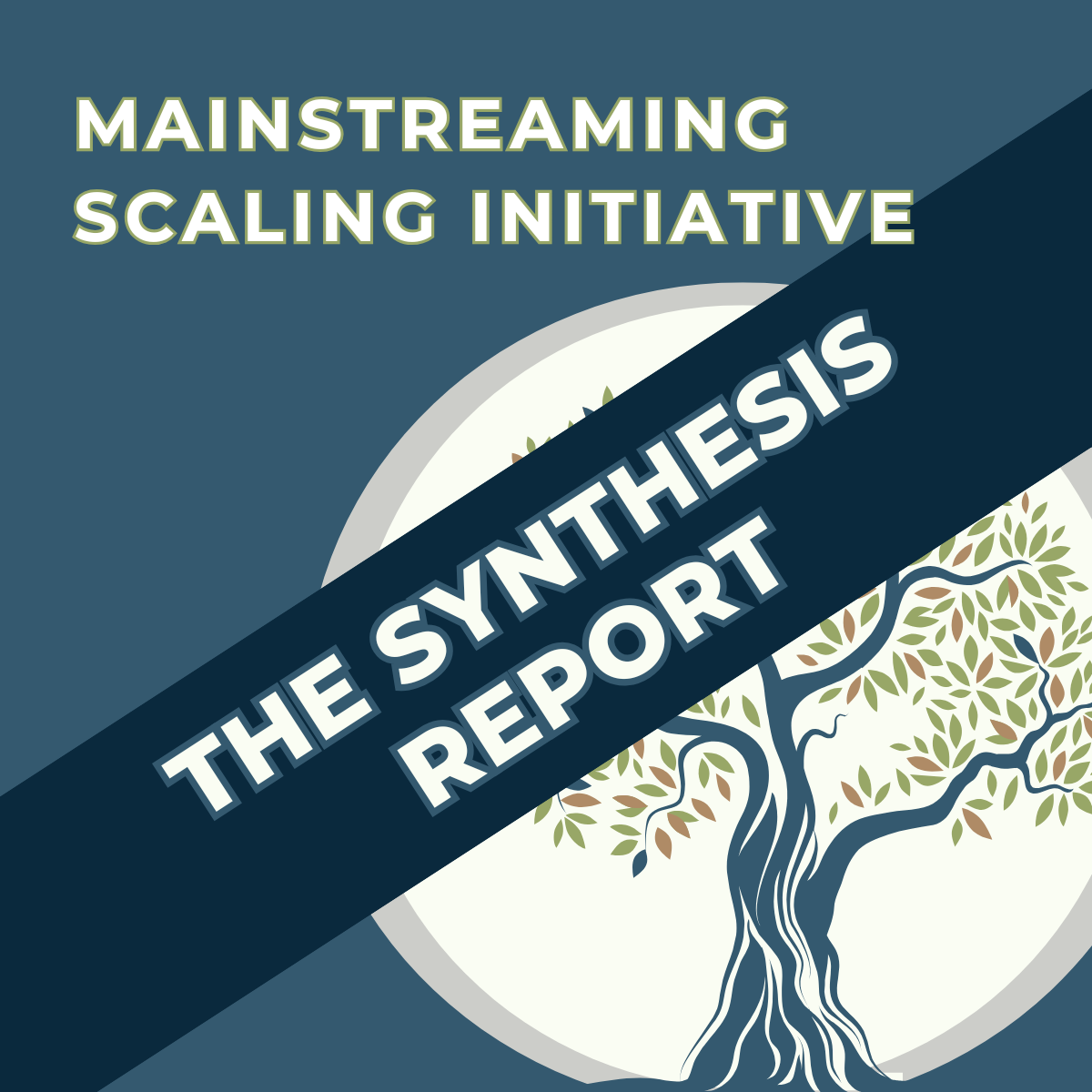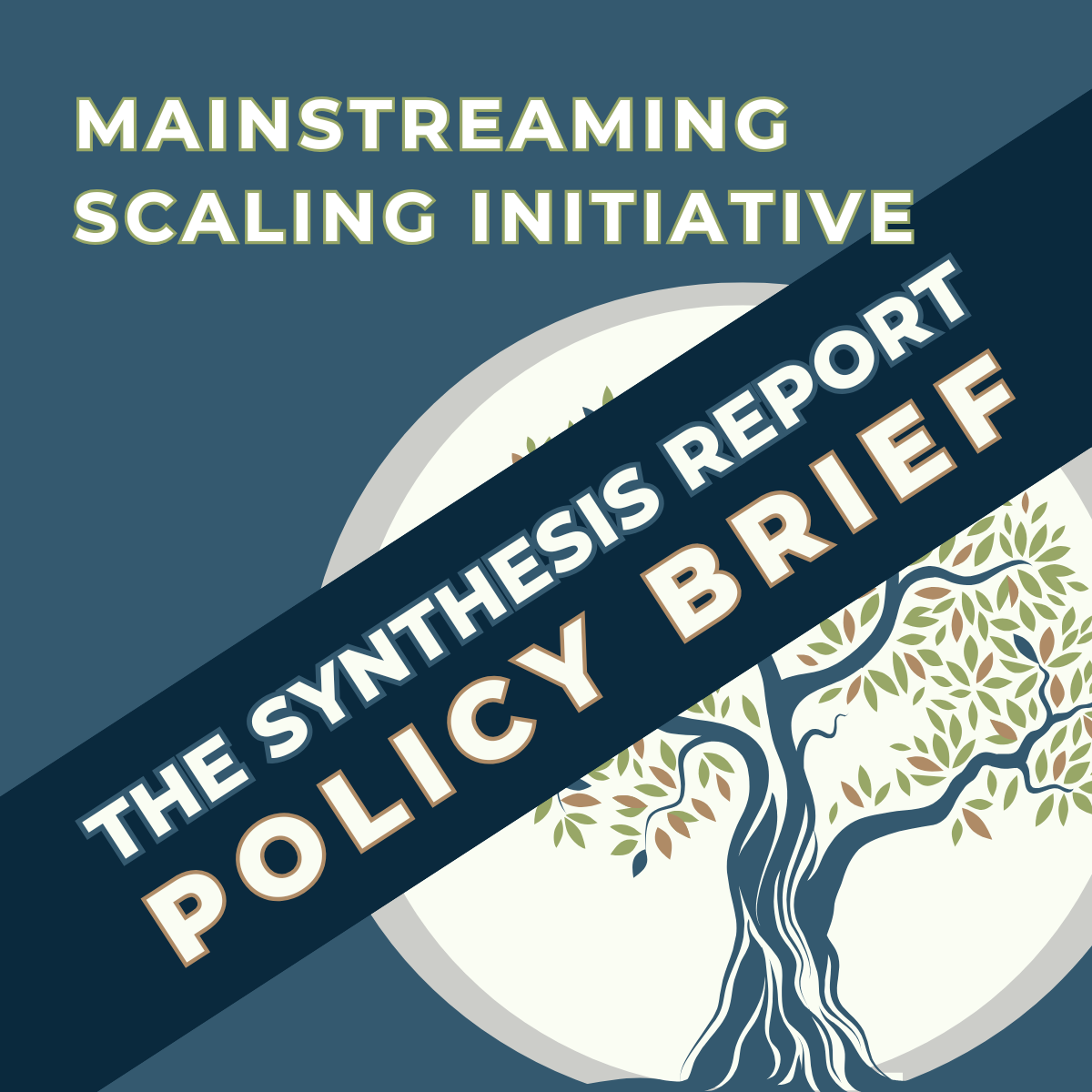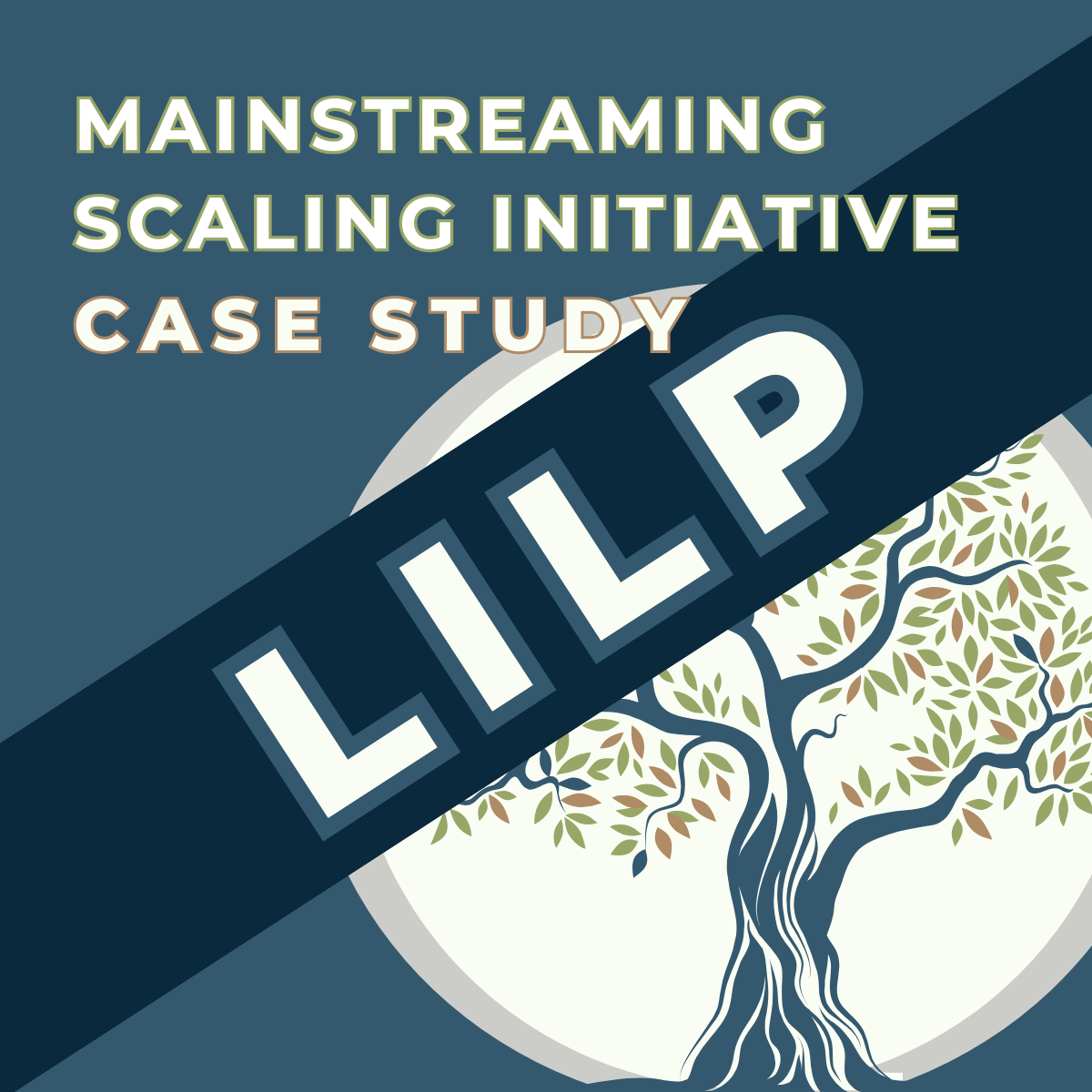Introduction
Agence Française de Développement (AFD) and the Scaling Community of Practice (CoP) entered into a strategic and financial agreement regarding a joint action-research initiative on “Mainstreaming the Scaling Agenda in Development Funder Organizations” to be implemented during 2023. The study team consists of Larry Cooley (Co-Chair of the Scaling CoP), Richard Kohl (Lead Consultant and Project Co-Leader), Johannes Linn (Co-Chair of the Scaling CoP and Project Co-Leader), and Ezgi Yilmaz (Junior Consultant). MSI staff provide administrative and communications support, in particular Leah Sly and Gaby Montalvo.
The concept note for the Mainstreaming Initiative lays out five components of a two-year program of work, of which the joint AFD-CoP initiative represents the first year. Progress is reported below for each component.
CLICK HERE TO READ MORE
Component 1. Agency level: scaling reviews for individual development funders
Two approaches are to be used to collect information and garner insight into the scaling activities of individual development funding agencies: (a) “inside-out”, i.e., assisting agencies in doing their own scaling reviews; and (b) “outside-in,” i.e., collecting evidence on the scaling performance of agencies from the outside.
Component 1.a: Inside-out analysis
A principal element of the study is to identify funding agencies that are interested in exploring their own scaling practices and pursuing a mainstreaming agenda. The initiative works with these agencies to help them assemble a case study on their journey to mainstream scaling in their organization and in a few cases (specifically, AFD) to define a suitable mainstreaming approach tailored to the specific characteristics and needs of the agency. For smaller agencies, this generally involves an agency-wide assessment. For large agencies an approach focusing on selected organizational units or programs is generally more appropriate.
During the first six months of the Initiative, the study team reached out to a total of 24 funder agencies to determine their readiness to participate as partners in the Initiative. Of the 24, the team reached firm agreement with 19 funders so far. The table in the Annex summarizes the status of agreements reached and of progress as of 30 June 2023. Of the 19 agencies with which we have firm agreements, 8 are active in the area of agriculture, rural development and food systems, while 11 are active in other areas (such as education, health, nutrition, etc.) or engaged in development finance across a wide range of sectoral and thematic activities. The total number (23) of potential funder partners in this phase of the Initiative is significantly larger than initially expected (10-15). The composition of the participating funder agencies is highly diverse, including large multilateral and bilateral funders, innovation challenge funds, foundations, international operating NGOs, etc. This broad range for funder organizations allows the study to identify to what extent mainstreaming challenges differ across different types of funders. The next phase of the research in 2024 can explore in greater depth selected funder categories.
For each partner agency a case study will be prepared (typically a paper of 10-15 pages in length) summarizing the mainstreaming journey of the agency, the lessons learned and the plans for further pursuit of mainstreaming. For each case study the team has identified (or is in the process of identifying) the person(s) responsible for the preparation of the case study and agreed with the agency concerned on an indicative list of questions to be addressed in the case study, based on a general template of questions prepared by the team. While a few case studies are prepared by staff from the agencies or by consultants hired by the agencies, most are prepared by the study team or experts from outside the agency, always in close collaboration with counterparts in the agencies. So far one case study has been completed (GIZ). The goal is to complete all case studies by October 2023 and then prepare an overview paper by the end of December 2023 summarizing the findings of the case studies and drawing lessons to share with the participating funders, the wider funder community, the Scaling Community of Practice and the development community at large.
The study team has devoted special efforts to work with its counterparts in ADF to explore how best to support the AFD mainstreaming effort. This has involved regular video conferences, review of documents, development of scalability criteria to be used in assessing the scalability of AFD projects, and advisory support to the ADF team in its exploration on how to advance mainstreaming in the organization. For various reasons, AFD’s internal decision making process on its scaling approach has been delayed and hence there has been less scope for the study team to engage than expected. A meeting of the principal CoP consultant (Richard Kohl) with his AFD counterparts is now planned for 18 July 2023 and will aim to define further work by the study team in support of AFD’s efforts.
In September, the team intends to organize an advisory group of representatives from the partner funder agencies to report progress with this component of work, to share preliminary insights and lessons, and to plan for future work during the next phase of the Initiative in 2024 including mobilizing additional financing.
Component 1.b: Outside-in analysis
This part of the work includes three activities: (i) review of independent evaluations of scaling which exist for selected funder agencies; (ii) review of sector-wide evaluations for selected multilateral funders; and (iii) survey of CoP membership. These activities will be pursued during the second half of 2023.
Component 2. Recipient level: The recipient perspective of how donor processes affect scaling
While important to draw on the recipient perspective of funder practices, this component will be pursued most intensively during the second year of the Initiative (2024). So far, the study team has made sure that recipient perspectives are reflected in contributions to the webinars organized under the Initiative (see Component 4 below). A survey of recipients, either freestanding or incorporated into a more general survey of the CoP membership, is planned for the second half of 2023.
Component 3. Systemic level: development effectiveness assessments and evaluations
Evaluation of the development effectiveness of funder agencies potentially represents an important instrument for supporting and incentivizing the mainstreaming of scaling in funder organizations. For this reason, the study team reviewed the evaluation guidelines of 18 official funder organizations and prepared a draft paper analyzing the extent to which the guidelines reflect scaling perspective. A key finding is that a majority of evaluation agencies do not consider scaling, or consider it only to a very limited extent in their evaluation guidelines. The paper has been sent to representatives of the agencies to seek feedback before the paper is finalized and disseminated with a view to stimulate action to have evaluation guidelines, and hence evaluations, focus more explicitly on scaling as a critical aspect of development effectiveness.
The study team also initiated exchanges with four relevant funder umbrella agencies that support the funder community with standard setting, evaluations and knowledge sharing: with three units in OECD-DAC – the innovation unit, the evaluation unit, and the peer review unit – and MOPAN (Multilateral Organization Performance Assessment Network). As part of the above mentioned review of evaluation guidelines, the study team also reviewed the evaluation and assessment guidelines and methodologies of the DAC evaluation and peer review units and of MOPAN. Again it found that scaling features only to a very limited extent in these methodologies. Building on this finding, the study team will engage in a dialogue with the DAC units and MOPAN to assist in any way possible in developing guidance for evaluators that more effectively focus their attention on the scaling dimension.
Component 4: Tools for tracking mainstreaming
To complement and underpin the work in the previous components, the Initiative aims to develop a standard set of practical criteria and metrics that can be used to assess the degree of mainstreaming of support for scaling in funder organizations and provide guidance on where additional action is needed. This includes the possibility of developing a “mainstreaming tracker” tool that will allow a systematic assessment of the degree of (and of changes in) mainstreaming in particular funder agencies. This tool will be developed during the second half of 2023 or deferred into 2024, depending on the progress with other components in the overall Initiative.
Component 5: Outreach and promotion of mainstreaming scaling in funder organizations
During the first half of 2023, the study team organized four webinars on mainstreaming scaling in funder organizations. The first seminar was a plenary session under the Annual Workshop of the CoP in January 2023, which was entirely devoted to introducing the new Mainstreaming Initiative and to discussing key aspects of the mainstreaming challenge and opportunity. A second webinar introduced and discussed the findings of the GIZ mainstreaming case study. The remaining two webinars presented specific funder partner organizations and their efforts to pursue mainstreaming (CRS and Harvest Plus) as part of their contribution to the case studies to be prepared subsequently. All webinars featured participation of speakers from recipient organizations. The study team will continue the series of webinars after the summer break. Beyond this, the team will develop dissemination, outreach and promotion plans to be implemented in 2024.
Other activities under the Mainstreaming Initiative
In addition to the five components planned for the Initiative and summarized in the Concept Note, three additional activities were pursued during the first six months of 2023:
- Establishment of a Mainstreaming Working Group under the Scaling Community of Practice: this working group will initially focus on supporting the Mainstreaming Initiative and disseminating and debating its findings, but eventually also will pursue the issue in mainstreaming in non-funder organizations (governments, private sector, CSOs, etc.).
- Preparation of a paper on scaling and localization: The issue of localization (ensuring more ownership for development programs in country institutions and channeling more resources to and through local organizations) is intricately interwoven with the scaling agenda. Members of the study team prepared a paper on this relationship for publication in a forthcoming UN report.
- Preparation of a paper on scaling and the SDGs: Achievement of the SDGs will only be possible if funders and implementers ensure that their projects and programs systematically support longer-term scaling pathways explicitly linked to specific SDGs and SDG targets. A paper published by a member of the study team makes the case that current approaches to achieve the SDGs need to be complemented with a more explicit focus on scaling the impact of development projects and programs.
Financing
AFD contributed Euro 45,000 (USD 47,405) to support the Mainstreaming Initiative and the CoP USD 25,000 from its general resources (including USD 15,000 from the Oak Foundation). Larry Cooley and Johannes Linn contribute their professional time on a pro bono basis.
Conclusion
Overall, progress under the Mainstreaming Initiative has been good. The great interest in the Initiative among many funder organizations and their willingness to contribute their experience is particularly noteworthy and encouraging. Also encouraging is the engagement with OECD-DAC and MOPAN. The main tasks for the remainder of 2023 are:
- completing 17+ quality case studies on time;
- working with AFD to support its mainstreaming efforts;
- engaging with the OECD-DAC evaluation and peer review units;
- preparing a cogent summary report by the end of 2023;
- developing a work program for the second year (2024) of the Initiative and mobilizing the funding to support that program
Annex. Mainstreaming Funder Case Studies
As of 30 June 2023
| Organization | Status |
| 1. USAID BRFS | Agreed |
| 2. Syngenta Found. | Agreed |
| 3. IITA/TAAT | Agreed |
| 4. One Acre Fund | Agreed |
| 5. CIMMYT | Agreed in principle |
| 6. One CGIAR | Agreed |
| 7. GIZ scaling advisory serv. | Agreed |
| 8. IFAD | Agreed |
| 9. AGRA | Agreed in principle |
| 10. Harvest Plus | Agreed |
| 11. Eleanor Crook Found. | Agreed |
| 12. GIZ | Agreed |
| 13. AFD | Agreed |
| 14. CARE | Agreed |
| 15. CRS | Agreed |
| 16. GCC | Agreed |
| 17. GFF | Agreed |
| 18. IDB-Lab | Agreed |
| 19. IDB | Agreed |
| 20. SOFF | Agreed |
| 21. Education (cross-cutting assessment) | Agreed |
| 22. Lincoln Institute of Land Policy | Agreed in principle |
| 23. World Bank | No case study, but ongoing advice and dialogue |
| 24. African Development Bank | Under consideration |


